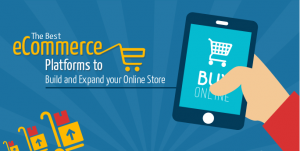We all are aware of the eCommerce giants globally, Amazon, Alibaba (Tmall, JD, Taobao) in China, Hong Kong and Asia. Most businesses use these channels to increase sales and boost their brand’s presence. However, the draw backs are:
- No control over customer data or data analytics
- Inability to upsell and gain proper margin with different functionality
- These channels charge significant commission, that cut away from profits
The solution: build your own eCommerce store that we call a “standalone” or brand.com store using a robust and agile eCommerce software. Moreover, most companies use Amazon and Alibaba, while also having a standalone store, creating an omnichannel.
How to make this happen? First find the right eCommerce Software.
eCommerce Software
So, we have companies that offer full-service solutions with the software and managed hosting included. We have software houses that offer just the software and expect you to find your own data centers, including an operations team to manage the servers. There are many factors, let’s go over briefly the main softwares/agencies used today, in particular in China, Hong Kong, and Asia.
Magento – Open source with an option of a paid version
Pros
- Inexpensive as the software is free. There is also a paid version with support. Fees will need to be paid to the developer/operations team.
- SMEs find it convenient for low volume websites
- Used globally
Cons
- Requires very experienced developers to set up the software and maintain it
- No support since it’s open source
- When the site scales up with more products and users, it becomes very difficult to manage and industry experts label the product as “Frankenstein”.
- Magento does not come with data centers, so you need to find and pay an operations team to choose the system and manage the servers – not full service
Hybris – SAP’s eCommerce software
Pros
- Supports high volumes of users
- Scalable with advanced functionality
- Developers available globally
Cons
- Very expensive: License fee is astronomical. After this licence is is paid, you still have to pay a proper developer to build the eCommerce website
- Still need to find a data center/operations team to fit with the Hybris developer – not full service
- Developer and Operations typically not united in the same company
Demandware – Now a Salesforce company
Pros
- An end to end eCommerce service, with development and operations included.
- Have their own data centers globally, and fully integrated with both software and data centers.
- Advanced functionality
Cons
- Very expensive: High set up fee and commission based charges on sales – undesired revenue share
- No servers in China: If you are building an eCommerce system for China, then their Hong Kong or Asia eCommerce servers will be insufficient
- Limited support for SMEs
Conclusion
In conclusion, choosing the right stand-alone store, is framed by many options, of different pricing, full-service vs software only and having all the best functionality to help you sell more. Typically companies will want to have a full-service agency, where the software and data centers are connected for one stop shop technology and service. Furthermore, budgets are increasingly tight as many firms go through a proof of concept and don’t want to have to spend too much upfront in venturing into different markets. Therefore, it’s safe to say, that your standalone eCommerce agency should have the following:
- Full-service agency – end to end development and operations
- Cost effective
- Advanced functionality
- Tailored to each region/environment
Even after your website is set up, you’re going to be spending tons of cash on marketing and driving traffic to the website, which further reinforces the need for a cost effective eCommerce site.
Contact us to learn more about eCommerce software in China, Hong Kong and Asia


